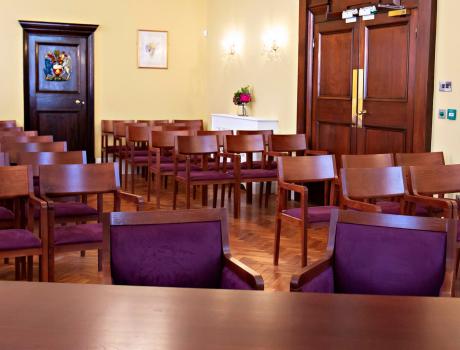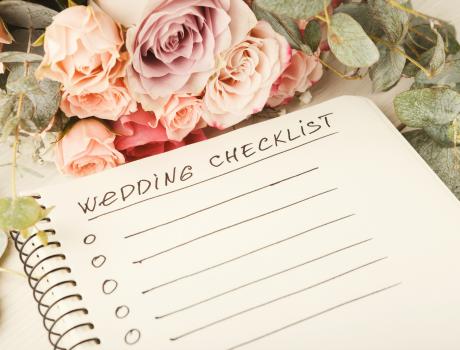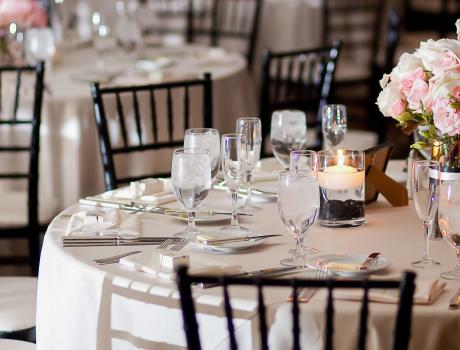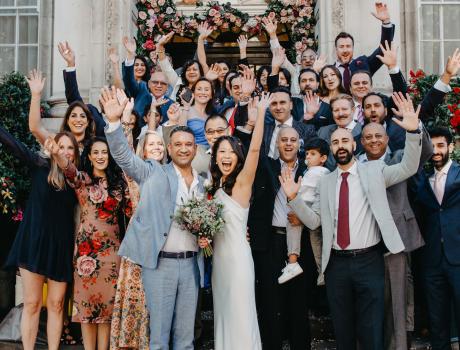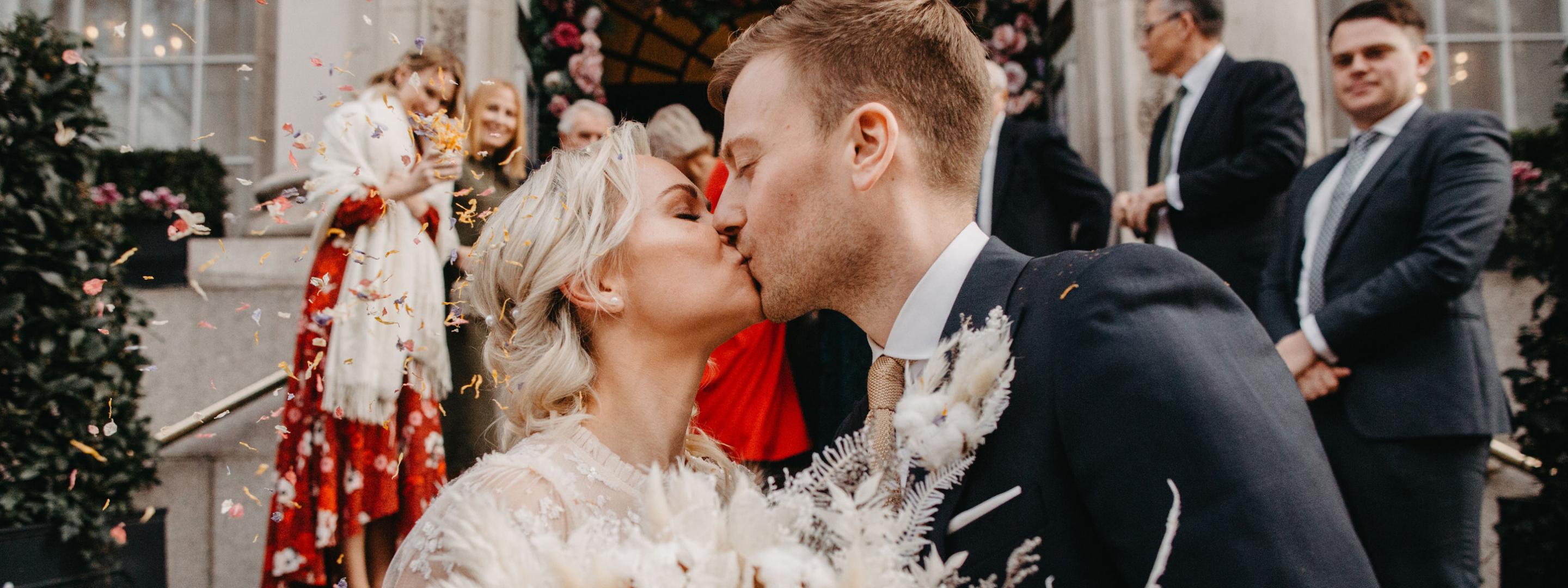
Marriage and Civil Partnership
You can get married or form your civil partnership in the Royal Borough of Kensington and Chelsea no matter where you live.
There are around 30 venues within the Royal Borough of Kensington and Chelsea which have been licensed for civil ceremonies.
The most famous of the venues within the Royal Borough of Kensington and Chelsea, and known worldwide, is of course our own Chelsea Old Town Hall. Designed in the late Victorian era and constructed in the early Edwardian era, the Chelsea Old Town Hall is a graceful building in the heart of Chelsea which houses six licensed rooms, namely the Brydon Room, the Rossetti Room, the Harrington Room; and the Main Hall, Small Halls, and Cadogan Suite.
Choose from one of the rooms at the Chelsea Old Town Hall, or any of our other approved venues
Ensure that you both attend your notice appointment at the latest 29 days before your ceremony date (71 days, if either of you is subject to immigration control) to gain legal clearance for your ceremony to proceed.
Choose a venue
Chelsea Old Town Hall
The most famous of the venues within the Royal Borough of Kensington and Chelsea, and known worldwide, is of course our own Chelsea Old Town Hall. Designed in the late Victorian era and constructed in the early Edwardian era, the Chelsea Old Town Hall is the most famous of the venues within the Royal Borough of Kensington and Chelsea, the Chelsea Old Town Hall is a beautiful and stylish classic building located on the King’s Road in Chelsea. The Chelsea Old Town Hall houses the Brydon Room, the Rossetti Room and the Harrington Room.
Other venues
Kensington and Chelsea is also home to a whole range of different venues for your ceremony. Some of our venues can offer facilities for parties of over 300 people whilst others are more suitable for smaller, intimate occasions. In order to be married or form your civil partnership at one of our approved venues, you must first make a booking with the venue of your choice before booking the registrars online.
Booking a ceremony
You can make a provisional booking for a ceremony at the Chelsea Old Town Hall – or other venues licensed for ceremonies in Kensington and Chelsea – online. Your ceremony booking is provisional until you’ve given notice of intention to marry or enter into civil partnership.
How and when to give notice of intent
Before you can get married or have a civil partnership in England or Wales, it’s a legal requirement to give notice before your ceremony. The earliest date that notice can be given is 12 months before the marriage or civil partnership.
If you are both British or EEA / Swiss citizens with settled or pre-settled status, then you must give notice (separately if required) at the register office in which you each reside. Notice must be given no later than 29 days before your marriage.
If one or both of you is a non-EEA citizen, or an EEA / Swiss citizen without settled or pre-settled status, then you both must give notice together at a register office in the district where one or both of you reside(s). You should complete your notice at least 71 days before your ceremony. There will also be an additional Home Office statutory referral fee of £24 which will be paid when booking your appointment.
If you are a non-EEA citizen and you hold settled or pre-settled status and you are marrying a British citizen or an EEA / Swiss citizen with settled or pre-settled status, then you must give notice together at the register office in which one of you resides. Notice must be given no later than 29 days before your marriage.
A person with settled or pre-settled status is required to share their status through the online EuSS status checker tool. You must request a six-digit code before your appointment from the GOV.UK page at View and prove your immigration status - GOV.UK (www.gov.uk)
Book an appointment to give notice of intention to marry
Book an appointment to give notice of intention to enter into civil partnership
Frequently asked questions
We’ve compiled the most frequently asked questions about ceremonies and notices into one place.
What documents do I need?
When you attend your appointment to give notice of intention, you must each bring the following documents with you:
- Your valid, original passport
- Your immigration status document (if applicable)
- A recent passport sized photograph each, if either of you is subject to immigration control
- Proof of address in one of the following formats: a bank statement dated within the last month; a utility bill dated within the last three months; a council tax statement dated within the last year
- If either of you has been married or in a civil partnership before, proof of how this ended e.g. your decree absolute of divorce or dissolution (or foreign equivalent); or death certificate of your former spouse and your last marriage / civil partnership certificate.
- A person with settled or pre-settled status is required to share their status through the online EUSS status checker tool. You must request a six-digit code before your appointment from the view and prove your immigration status GOV.UK page.
The statutory fee for giving notice is £35 per person, payable at the time of booking the appointment. There is an additional Home Office statutory referral fee of £24 for those subject to immigration control. There is also a statutory fee of £75 for clearance of foreign divorces or dissolutions.
All documents must be originals. Any documents not in English must be accompanied by a third party translation into English on which the translator certifies that it is a true and accurate translation of the original document seen by them.
Each person who does not speak English must attend the appointment with an interpreter.
If you live abroad, please read the "Advice if residing abroad" section below.
Once you’ve given notice of intention, we ask you to pay the ceremony attendance fee for your ceremony and submit your ceremony choices form, so that we can ensure everything ready for our big day and your ceremony will be tailored to your exact wishes.
Advice if residing abroad
In order to get married or have a civil partnership in England or Wales, the law requires you both to be resident in England or Wales. Resident means both of you having been at one address in England or Wales for at least eight days immediately prior to the date of your appointment to give notice of intention to marry or enter into civil partnership. Therefore, if one or both of you are residing abroad, you will need to return to England or Wales for at least eight days in order to give notice of intention to marry or enter into civil partnership. Your marriage or civil partnership can proceed 29 days after you give notice (sometimes 71 days if either of you does not have the correct immigration status).
You must bring to your appointment all the required documents as stated above in the ‘What documents do I need’ section. We understand however that if you are residing in England or Wales for at least eight days to give your notice of intention, it may be difficult for you to obtain the usual proof of address. In these circumstances only, we are able to accept alternative evidence as proof of address. This should be an official letter signed by the occupier of the property where you are residing, confirming that you have lived at the property for at least the eight days immediately prior to your appointment to give notice of intention. They should include the address of the property as well as their name and contact details, ensuring that the letter is dated immediately prior before the appointment. The occupier can be the friend or family member whose property you are residing in or, if you are staying in a hotel, the hotel manager / administrator. If this is not possible then a provisional bill from the hotel should be obtained containing your names and dates of stay. In both cases, please also bring proof of your date of arrival such as a stamp in your passport or flight confirmation to support the contents of the letter.
After having given notice, you are both free to travel again before the date of your marriage or civil partnership. Your marriage authorities or civil partnership schedule is valid for one year from the date that you gave notice, for your chosen venue only. It is therefore your choice whether you remain in the UK after you’ve given notice until your ceremony, or whether you prefer to leave the UK to return later in the year for the ceremony itself.
Registrars cannot give immigration advice. You must ensure that you have the relevant visa for marriage or civil partnership before entering the UK ideally to give notice and definitely for the ceremony itself. If you don’t have indefinite leave to remain or diplomatic immunity, this would usually be a fiancé visa (for a non-EEA national residing abroad joining a partner in the UK who is British, EEA/Swiss with (pre-)settled status or non-EEA/Swiss person with (pre-)settled status in the UK) or a marriage visitor visa (if both of you are entering the UK solely for your marriage or civil partnership and will leave the UK again immediately afterwards). Both of these visas are usually valid for six months from the date of application, so if you obtain these visas to give notice and are planning to leave the UK after you give notice, make sure you return for your ceremony before the visa’s expiry. For more information visit the GOV.UK website.
We regret that there are no exceptions to this rule, even if you are a British citizen living abroad. You cannot give notice from abroad such as at a British embassy – this includes from Ireland or Northern Ireland, Isle of Man, Jersey or Guernsey and its dependencies. Special legal arrangements are in place if one of you is usually resident in Scotland; in these cases, please contact us at [email protected] for further information.
How much our ceremonies cost
To view our fees and charges, please click on the ceremony room below and then view the prices under specification:
To view our fees and charges for our approved venues, please click the link below and then choose your chosen venue to view the prices:
Converting a Civil Partnership into a Marriage
The Marriage (Same Sex Couples) Act 2013 provides for couples currently in a civil partnership to be able to convert this into a marriage. Under current legislation, there is no provision to convert an opposite sex civil partnership to a marriage in England and Wales. Similarly, you cannot convert a same sex or opposite sex marriage to a civil partnership.
If you wish to convert your civil partnership to marriage you will only be able to do so if your civil partnership took place in England or Wales (or overseas in a British consulate or armed forces base where it was registered according to the laws of England and Wales) on or after Monday 5 December 2005, you are in a same-sex civil partnership and as long as your civil partnership has not been dissolved.
There are two different types of Civil Partnership conversions: a one stage procedure and a two stage procedure.
| Stage 1 | Stage 2 | |
|---|---|---|
| Procedure | The one stage procedure is when you have a ‘conversion’ appointment in which the ‘conversion declaration’ is prepared and signed. There is no ceremony as part of Stage 1 however you may opt to say an official ‘Declaration Wording’ to each other if you so wish. | The two stage procedure is when you have a ‘conversion’ appointment in which the ‘conversion declaration’ is prepared. On a subsequent date you then attend an approved venue where you sign the conversion declaration and have a non-legal Conversion Ceremony to celebrate your new status. |
| Cost | £45 plus £11 per certificate | £27, plus cost of ceremony, plus £11 per certificate |
- You may attend your ‘conversion’ appointment in a Register Office of your choice and this Register Office does not have to be the same one in which your civil partnership took place. This means that even if your civil partnership did not take place within the Royal Borough of Kensington and Chelsea you will still be able to have your conversion here.
- When you attend your ‘conversion’ appointment both of you will need to be present and to bring with you your passports, most recent proof of your addresses and your legal civil partnership certificate. During this appointment the ‘conversion declaration’ will be prepared for signing.
- Your civil partnership becomes a marriage when both of you sign the ‘conversion declaration’. This declaration confirms that you have not dissolved your civil partnership and that you both wish to convert your civil partnership into a marriage.
- Once you have signed your ‘conversion declaration’ your marriage will be deemed to have existed since the date of your civil partnership.
- Please note that a conversion is not a marriage ceremony, although you will be issued with a marriage certificate to confirm that your civil partnership has been converted into a marriage. If you choose the Stage 2 procedure you will be able to have a ceremony as part of your celebrations where you may say words to each other and exchange rings.
- If you are using the Stage 1 procedure you will be issued your marriage certificates at the end of your ‘conversion’ appointment.
- If you are using the Stage 2 procedure your marriage certificates will be available for you to collect from the Kensington and Chelsea Register Office on the next working day.
Book a civil partnership to marriage conversion

